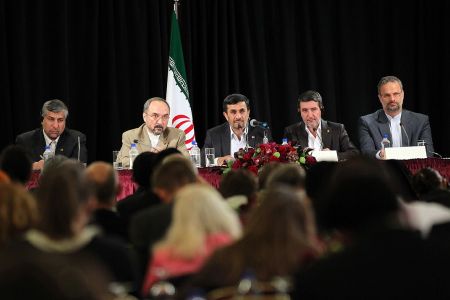"The nations of the region are fully capable of establishing and providing their own security"
 Iranian President Mahmoud Ahmadinejad called on NATO, US and Britain to withdraw their forces from the Gulf since they are a “threat to security.”
Iranian President Mahmoud Ahmadinejad called on NATO, US and Britain to withdraw their forces from the Gulf since they are a “threat to security.”
At a press conference on the sidelines of the 66th annual session of the UN General Assembly in New York on Friday, Ahmadinejad said that Iran has always respected other nations' rights, noting that such rights cannot be realized through NATO bombs or interference by foreign states.
"Any tool that can prevent clashes and potential conflict will be welcome. And I don't think there is any need for confrontation," he said. "But I think the best long term solution to this problem is for the foreign forces to leave the Persian Gulf. There is no need in the Persian Gulf for the presence of the NATO forces," the Iranian leader told journalists.
"The nations of the region are fully capable of establishing and providing their own security," said Ahmadinejad. "Perhaps some will pretend that energy security is at risk. For decades the countries in the region have been able to shoulder their responsibility for that security.”
"I tell you in no uncertain terms today that NATO - the Great Britain and American forces - if they leave the Persian Gulf and the Sea of Oman, Iran will guarantee the route of energy trade in the region and the security in the region at large," the president added.
He also spoke about NATO's decade-long presence in Afghanistan and said interference in other countries' affairs will only complicate problems.
The United States and European navies have stepped up their presence in the Gulf in recent years. The United States has a naval base in Bahrain and France opened a base in Abu Dhabi, within 250 kilometers (155 miles) of Iran's coastline, in 2009.
Elsewhere in his remarks, Ahmadinejad stated that the Palestinian people have the inalienable right to have an independent state, adding that Palestine has always existed and the statehood move at the UN should not be viewed as an attempt to set up a new state.
In response to an Egyptian reporter who asked about the prospects for the restoration of ties with Cairo, he said that Tehran is waiting for the establishment of a government based on Egyptians' votes and then will continue its efforts to normalize ties with the North African country.
When asked about the possibility of cooperation between Iran and Russia on the construction of another nuclear reactor in Iran, Ahmadinejad said that Iran plans to produce 20,000 megawatts of nuclear electricity in the future, and the Bushehr nuclear power plant can produce about 1,000 megawatts, adding that talks are being held with the Russians to help facilitate this goal.
